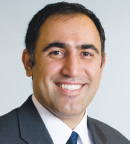
Complete remission remains a robust criterion in AML—better than other response criteria—and there is a growing interest in minimal residual disease to allow us to tease out the depth of remission.— Amir T. Fathi, MD
Tweet this quote
“In the past few years, there has been increased reporting of other, less traditional, response criteria in acute myeloid leukemia (AML), including morphologic leukemia-free state, partial response, and complete remission [or complete response] with incomplete recovery. There is some concern that using these endpoints may make interpretation of trial results murkier in determining which patients benefit from therapy. The finding that complete remission, a traditional endpoint that describes a decrease in marrow blasts to less than 5%, recovery of blood counts, and no extramedullary disease, appears to be the most robust predictor of survival reinforces the importance and significance of this endpoint compared to others,” explained Amir T. Fathi, MD, Director of the Leukemia Program at Massachusetts General Hospital and Assistant Professor of Medicine at Harvard Medical School, Boston.
Dr. Fathi also explained that the field is also perhaps gradually moving toward using minimal residual disease status as an aspect of disease response assessment. Techniques such as flow cytometry, cytogenetics, and genomic assays can be used to assess minimal residual disease. “These techniques can better assess the depth of remission,” he added. “There are two trends: Complete remission remains a robust criterion in AML—better than other response criteria—and there is a growing interest in minimal residual disease to allow us to tease out the depth of remission, perhaps in the years to come.”
Minimal residual disease is currently being incorporated and studied in clinical trials, but it has yet to be included in the National Comprehensive Cancer Network® (NCCN®) Guidelines for AML. Dr. Fathi predicts that this may gradually change over time with increasing data and experience. ■
Disclosure: Dr. Fathi has been a consultant for Seattle Genetics, Celgene, and MedImmune and has received clinical trial support from Takeda, Seattle Genetics, and Celgene.

